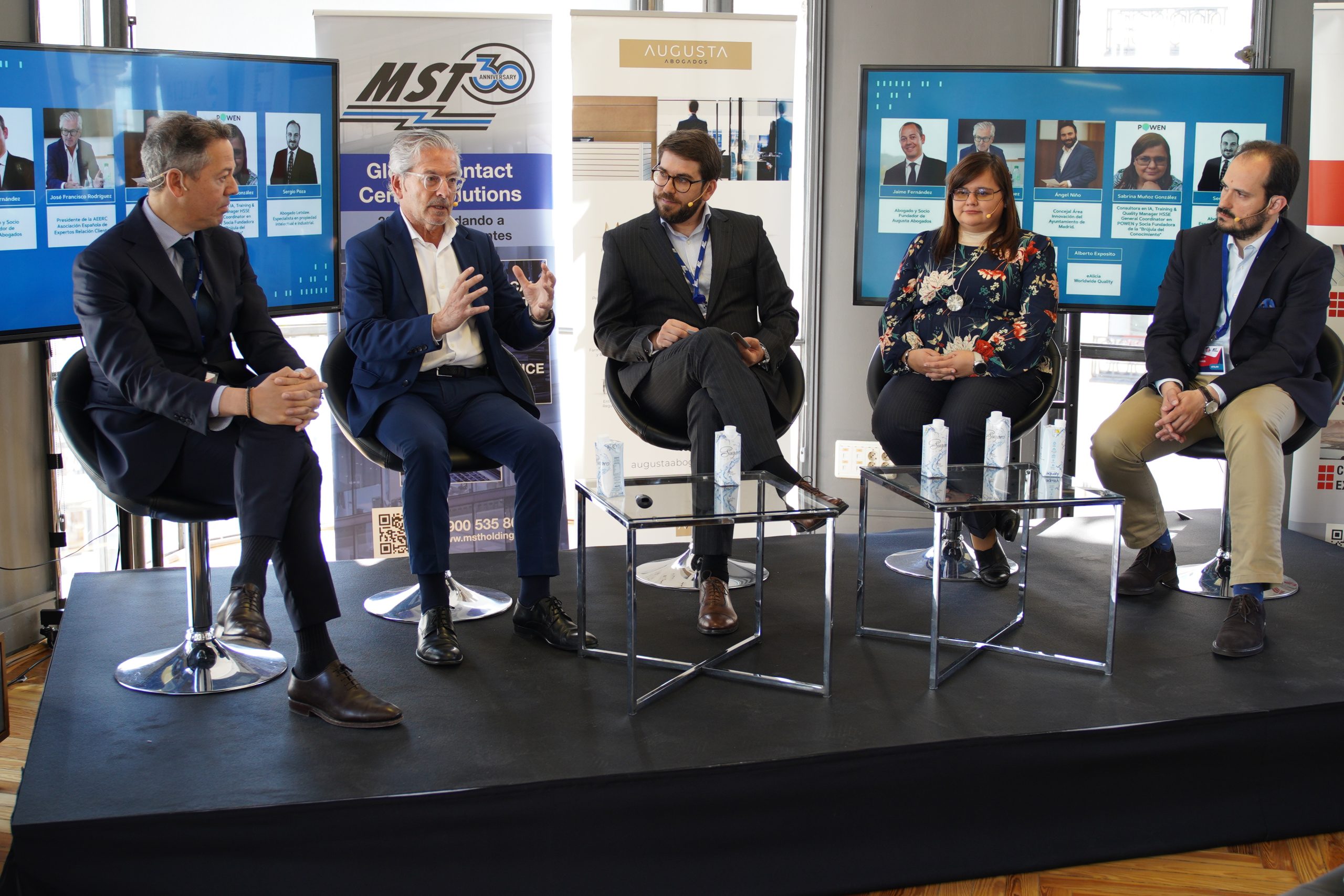Barcelona, May 06, 2024
In a joint initiative between MST Holding, Consulting C3 and SottoTempo, a day dedicated to exploring the scope of the recent Artificial Intelligence Law and the Customer Service Law was held with great success on April 29th in Madrid.
**The new Customer Service Act is a proposal that the current government rescued from the last legislature, when it began to be processed in Parliament, although it eventually lapsed due to the call for a general election in July 2023.. **
The event, which brought together more than 50 leading professionals from various sectors, had as its main purpose to deepen the understanding of these laws, with the participation of Jaime Fernandez, partner of Augusta Abogados. The subsequent debate was structured in a round table composed of experts in the field, who shared their perspectives on the impact of these regulations on both companies and consumers.
The round table was chaired by José Francisco Rodríguez, President of the AEERC (Spanish Association of Customer Relationship Experts); Jaime Fernández Cortés, founding Partner of Augusta Abogados; Sabrina Muñoz, Founding Partner of La Brújula del Conocimiento; and Sergio Poza Martínez, Digital Area Manager of Letslaw. This panel of experts was in charge of exchanging opinions, resolving doubts and enriching knowledge on the subject. Alberto Expósito Medina from eAlicia Worldwide Quality was in charge of the moderation.
Here is a short guide to how the roundtable discussion went.
To start with, our colleague Alberto Expósito encouraged the participants to give a first opinion on the two laws and what they considered most relevant.
Sergio Poza was the first to comment that the two laws are intended to focus on the users. The authorities perceive they need to feel more protected and are launching these laws. For him, these laws are psotive but with a lot of regulatory compliance burden that under his point of view should be simplified so that users get the specific, fair and necessary information.
Sabrina Muñoz explained that all companies have a legitimate fear of AI, but this law places all of Europe on the same page and allows us to compete in a better way. Larger companies are very concerned about data governance and this factor is becoming more complex in issues such as AI, as the technology is often more important than what we do in terms of security, so having a regulatory framework that allows us to work under the same conditions, at least in Europe, can be a positive thing for everyone.
Sabrina Muñoz went on to explain that if companies with business outside Europe want to come to Europe they will have to adapt to these regulatory conditions. “For me it will be positive, although it will be complicated, it will increase the tension, it will make the processes much more complex (but for us and for the competitors coming from outside). It is a regulation that can be improved, but it already establishes a common basis for everyone to work on and that is positive. The AI law helps us a lot to be a line of cybersecurity” argued Sabrina Muñoz.
It was José Francisco Rodríguez’s turn and he began talking about the AI law. According to him, in a world as global as the one we live in, we believe that perhaps there has been too much haste in passing a law when the economic environment that rules in this world, such as the USA or China, is in another league. It may be that for the consumer there are improvements, but from the economic point of view the big investments happen outside Europe. We feel that there has been too much haste in some aspects.
Regarding the Customer Service Law, José Francisco Rodríguez said: “We are a bit bored of being continually hammered with laws. Regarding the 2021 report, which is the same as the current one, the Ministry of Digital Transformation itself said that a Law was not necessary, that it was enough to modify the Consumer Law, which makes sense”.
Jaime Fernández Cortés said that what we see in these regulations is that they start from a fairly clear bias against companies or customer services, it seems they say things are done badly and that translates into a regulatory text with obligations that are sometimes disproportionate or are not what would really correspond or could protect consumers and that would be the most negative part. Jaime Fernández Cortés added “I am trying to look for the positive side, these are minimum standard laws, they require a minimum parameter of compliance but above that it is always possible to customize and give value to the customer. Now it is time to make changes and I am sure there are ways to do it that can distinguish us from the competition. Obviously, small companies will have more difficulties in the basic compliance with these regulations, but medium-sized and large companies have the opportunity to create more of a gap”.
Our moderator Alberto asked José Francisco Rodríguez about the work of the AEERC and about the process of meeting with the political groups.
José Francisco Rodríguez explained that it is a much less sophisticated world than we think, “When we meet with legislators we are surprised by the lack of information and knowledge on the subject and many issues remain in anecdotes”. He also explained all the administrative dynamics involved and the complexity of the amendments up to their approval. He concluded by remarking that it is an exhausting and sometimes frustrating issue, but that they hope to achieve the best possible outcome for everyone.
Alberto Expósito guided the conversation towards the more operational side of how these laws impact customer services.
Sabrina Muñoz commented that in the end, the laws imply many small changes that when added together mean really differential changes in the companies. In her opinion this law presents its good and bad aspects, each company depending on the sector in which it is located will have to adapt according to what the law says because it will directly affect our customers and this will affect our day to day service.
She was joined by Sergio Poza: “We will have the responsibility to choose our suppliers that meet all the requirements. Companies have to take responsibility for what they use at the AI level. We have to carry out an internal study to verify that we comply with everything”.
An important part of the presentation focused on data management.
José Francisco Rodríguez said “I believe the great challenge for the industry in general is data. What this law is achieving is that future access to data that allows the business management of a business, making value propositions and CX better, may be limited. In fact, it may happen that with this type of law there will come a time when there is no data”.
Alberto Expósito posed the question: “Data is important, but where should it be? Where do you think data is most secure?
Sabrina Muñoz was of the opinion the data is safe depending on who works with it. “My doubt is not in where we place the data, in which server, in which system, but in the capacity we have to teach our people what to do with the data and how to protect it. It is very important how our teams are taught to work with the data. We have to teach our people how to work with data and how to work with AI,” remarked Sabrina Muñoz.
Alberto Expósito guided the meeting towards the impact of these two laws at the employment level.
Here all the speakers agreed on the idea that jobs will be eliminated, but many others will be modified and hence the importance of training our agents to work with AI and be better than their competitors. They stressed the idea that AI has not come to take away jobs, it has come to help us become more efficient. “I’m not afraid of AI, I’m afraid of the competitor using AI. Train our people or we are out of the market,” said Sabrina Muñoz.
For Sabrina Muñoz, where we add value, there is the human factor; the rest can be done by AI. Let’s focus our people on that differential value.
José Francisco Rodríguez remarked that the future of AI also depends on the generation with which it interacts. This is a reality that will increase, there will be issues that require a human, but automation will undoubtedly be and is already a reality. We are at the beginning of all this and that is why investments are not yet coming in a clear way in AI.
And to end the debate at the table, our colleague Alberto Expósito made the following reflection: “There is a value that must be differential, which is the customer experience or the experience of the worker within the structure. It is great to move forward, but I believe there is also a fundamental exercise to do, and not to forget the customer, the one who buys from us. It is a complex equation within the quality areas: is it really going to be useful, are you really going to amortize this investment, do you really know how it is going to impact your customer? It is important to work on this balance, to know our customers and, above all, not to deviate from the minimum quality standards when we incorporate this technology.
With this conclusion, the roundtable discussion came to an end and a light lunch was served, giving all participants the opportunity for dialogue and networking.
The meeting provided an invaluable opportunity to delve into the role of the new laws governing Customer Service and the growing importance of Artificial Intelligence in this area. It was an occasion in which all participants were able to learn and continue to improve the way they serve their customers.
For more information, please contact: marketing@mstholding.com

